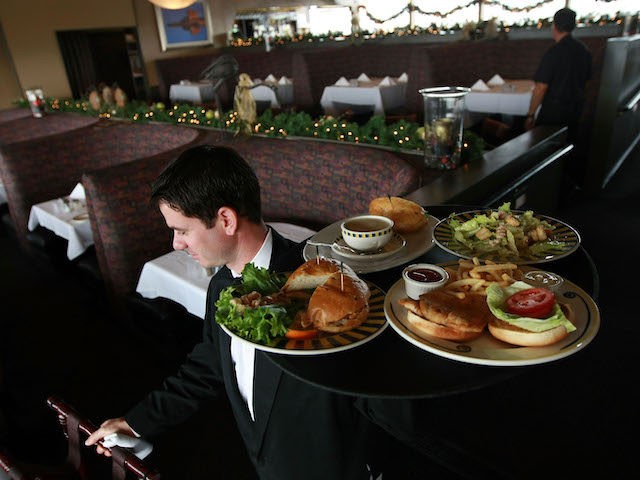The wealthy New Yorkers who have helped spike housing prices in the Hamptons’ beach towns now are complaining about the higher wages they must pay to their fellow Americans, say media reports.
The wages are rising partly because former President Donald Trump shut d0wn the supply of migrant labor for the 2021 season. But the supply of labor has also been reduced because New Yorkers’ used their stock-market wealth to bid up the price of local housing as they fled the city during the coronavirus pandemic.
Search through “neighborhood app Nextdoor and you’ll find people ‘desperate’ for an electrician, a plumber, a gardener, or a house cleaner,” said a Vanity Fair report from the Hamptons, which are located in the Northern part of Long Island above New York City.
“I can’t seem to find a person to cut my lawn…. I had someone for years, but I think he is too busy with [another] estate job,” one person told Vanity Fair.
“As for workers, it’s a name-your-price situation. The überwealthy have snatched up a lot of staffers, but even money can’t fill every job,” the article said.
In 2020, Trump’s deputies curbed the supply of 2021 seasonal workers, and some of the wealthy New Yorkers are being forced to change their opinions about Americans who work with their hands. According to Vanity Fair:
For the one East Hampton resident, the absolute worst has happened. “I had to buy a lawn mower and cut my own lawn. I wanted flowers planted behind the pool. The landscaper didn’t show up. I had to do it myself,” this person said. “My brother just showed me how to use the thing that trims the weeds. Yesterday, I finally did that. I had to take my $800 sneakers off first, but it was actually satisfying.”
The tight labor market in the Hamptons is great for Americans who earn a living with their hands, the New York Post reported July 14:
Keeping cooks is also tough. “The kitchen side has become a war zone because wealthy [restaurant owners] are willing to increase the wage base to the point where smaller operators can’t compete,” [owner Jesse Matsuoka] said.
Plus, “my top servers are walking away with $2,000 a week, but it’s a lot of work and pressure,” Matsuoka admitted.
But the Hamptons’ labor shortage is the exception. There are few wage gains for Americans in many other parts of the country, partly because wages are dragged down by the federal government’s long-standing economic policy of importing cheap labor from other countries.
That nationwide flood of migrant labor is rising fast because at least 500,000 job-seeking migrants have accepted the January welcome offered by President Joe Biden’s border officials.
Federal data shows that “people are getting raises, but they’re just more or less the same as they were before the pandemic or, perhaps, even a little bit lower,” Yahoo News reported July 27. Nationwide, “there is not a huge boost in pay going on.”
Yahoo News reported July 30:
Job switchers saw their wages grow 5.8% year over year in June, while job holders experienced a 3.1% gain, according to a report by ADP derived from payroll data of 18 million workers. Overall, wage growth decelerated from the first quarter, while still growing 2.3% in June compared with a year earlier.
The expensive housing in the Hamptons deters many Americans from moving there to work the service jobs that are funded by wealthy residents. “Blame the skeletal labor force on three factors,” said the July 24 report in the New York Post:
[The] lack of J-1 visas due to COVID that prevented the usual influx of workers from Eastern Europe and Ireland; the increasingly prohibitive cost of staff housing; and the lure of collecting enhanced federal unemployment benefits.
The July 8 report from the Hamptons follows a June 26 article in the New York Times, which reported:
“Right now it is full season in the Hamptons and we are closed Sundays and Mondays; we don’t have enough cooks,” said Eric Lemonides, the co-owner of Almond, which is typically open seven days a week. “It’s just been harder than it’s ever been before.”
The Hamptons is experiencing the same constellation of factors that has contributed to a national employment crisis — but here it is supercharged by elements unique to the upscale towns: Untold numbers of New York City residents fled during the pandemic, gobbling up the housing stock and driving up prices as they turned the summer escape into a year-round residence.
Plus, a spate of recent laws designed to limit the number of shared houses — seen by some as nuisance party houses — has sharply limited places where summer workers say they can afford to stay.
Overall, businesses want to import more migrants — even very poor migrants — because they spike consumer sales, boost rental rates, cut wages, minimize workforce pushback, and so raise profits and stock values. They also serve as clients for welfare agencies, as, eventually, as voters for Democrat activists.
But migration damages ordinary Americans’ career opportunities, cuts their wages, raises their rents, curbs their productivity, shrinks their political clout, and fractures their open-minded, equality-promoting civic culture.
In general, legal and illegal migration moves wealth from employees to employers, from families to investors, from young to old, from children to their parents, from homebuyers to investors, from technology to stoop labor.
Biden’s decision to restart the economic extraction of valuable consumers, renters, and workers from poor countries also helps to move wealth — and social status — from heartland red states to the coastal blue states. Within each state, the extraction policy also helps to move wealth and status from GOP rural districts to Democrat cities.
Unsurprisingly, a lopsided majority of Americans oppose labor migration.

COMMENTS
Please let us know if you're having issues with commenting.